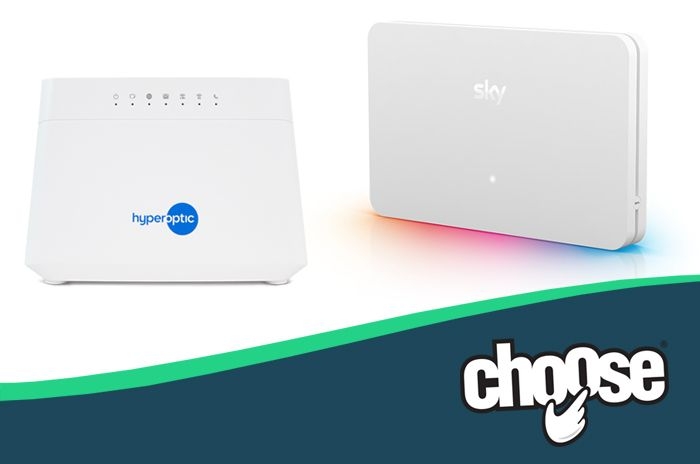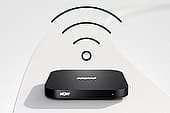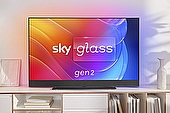Hyperoptic have focused on connecting buildings and apartment blocks to full fibre broadband, and stick to simple pricing with no mid-contract price hikes.
Sky broadband, on the other hand, retail Openreach full fibre broadband across the UK, with competitive pricing and comprehensive add-ons to choose too.
Overall, Sky are cheaper than Hyperoptic without sacrificing their customer service experiences or optional service upgrades either.

At a glance: Sky vs Hyperoptic
| Sky Broadband | Hyperoptic | |
|---|---|---|
| Monthly price | From £25 | From £17.99 |
| Setup cost | £5 (Refundable) | Up to £39 |
| Minimum term | 24 months | 1 / 12 / 24 months |
| Annual price rise | Prices may rise | None |
| Connection | Part fibre, full fibre | Fibre to the building, full fibre |
| Download speeds | 61Mb, 75Mb, 150Mb, 500Mb, 900Mb | 33Mb, 57Mb, 158Mb, 522Mb, 900Mb |
| Upload speeds | 16Mb, 27Mb, 60Mb, 90Mb | 1Mb, 5.7Mb, 158Mb, 528Mb, 900Mb |
| Router | Sky Max Hub | Zyxel Hyperhub |
| WiFi guarantee | From £4/mth for up to 25Mb | £7/mth |
| Parental controls | Sky Broadband Shield | Not available |
| Home phone | Included with all deals | £2 - £3/mth |
| Anytime calls | £16 (inc. UK mobiles) | £3/mth (UK landlines only) |
| TV | Sky TV | Not available |
Best deals
| Package | Broadband | Monthly price | Upfront price | Contract term | |
|---|---|---|---|---|---|
 |
Full Fibre 150 | 150Mb average | £27 | £5 | 24 months |
 |
Superfast (24 months) | 159Mb average | £26 | £19 | 24 months |
Price
Winner: Hyperoptic has a cheaper budget entry-level deal than Sky, but Sky is cheaper than Hyperoptic across equivalent ultrafast and gigabit speed packages.
Hyperoptic offer a Light 30Mbps broadband plan which costs just £17.99 per month, making it one of the cheapest ways to get fixed-line broadband in the UK.
It doesn't have any eligibility requirements, like other low-cost social tariffs do, and Hyperoptic also promise no mid-contract price hikes, so the price won't creep up either. Setup is low at just £10, and the introductory price point of £17.99 lasts for 24 months.
| Package | Broadband | Monthly price | Upfront price | Contract term | |
|---|---|---|---|---|---|
 |
Light 30Mb (24 months) | 33Mb average | £17.99 | £10 | 24 months |
 |
Full Fibre 75 | 75Mb average | £26 | £5 | 24 months |
However, as you move up to 100Mb and faster plans, Sky start to beat Hyperoptic on price, coming in around three pound per month less and with cheaper setup fees too:
| Package | Broadband | Monthly price | Upfront price | Contract term | |
|---|---|---|---|---|---|
 |
Full Fibre 500 | 500Mb average | £31 | £5 | 24 months |
 |
Ultrafast (24 months) | 527Mb average | £31 | £19 | 24 months |
At the top end of the scale, both providers offer a gigabit broadband deal, yet, Hyperoptic is currently cheaper than Sky due to special offers running until 8th January 2025:
| Package | Broadband | Monthly price | Upfront price | Contract term | |
|---|---|---|---|---|---|
 |
Hyperfast (24 months) | 900Mb average | £35 | £19 | 24 months |
 |
Full Fibre Gigafast | 900Mb average | £38 | £5 | 24 months |
Hyperoptic beat Sky in terms of annual price rises as well, because prices with Sky will rise each year, although they don't specific by how much it's likely to be around £3 per month. However, Hyperoptic don't increase prices during a minimum term at all, so could work out cheaper over a longer contract length.
Households who want a home phone line will get one included in the standard price with Sky, but will have to pay an extra £2 to £3 per month with Hyperoptic, but then anytime calls are cheaper at just £3 per month for all UK landline calls, compared to £16 per month with Sky.
Overall, Hyperoptic offer the cheapest entry-level plan, and over the contract may also work out cheaper than Sky, as even though they start a little higher prices won't rise each year.
Broadband packages
Winner: Sky offer more standard and premium features than Hyperoptic, including parental controls, a WiFi guarantee and discounts on Sky TV. While Hyperoptic do offer more contract options, their broadband has less frills.
Both Hyperoptic and Sky offer a wide-range of broadband packages, but there are differences between them, including in terms of contract length, parental control tools, and optional extras.
Here are their main broadband packages side-by-side for comparison:
| Package | Broadband | Monthly price | Upfront price | Contract term | |
|---|---|---|---|---|---|

|
Full Fibre 75 | 75Mb average | £26 | £5 | 24 months |

|
Full Fibre 150 | 150Mb average | £27 | £5 | 24 months |

|
Fast 50Mb (24 months) | 55Mb average | £26 | £19 | 24 months |

|
Superfast (24 months) | 159Mb average | £26 | £19 | 24 months |

|
Full Fibre 500 | 500Mb average | £31 | £5 | 24 months |

|
Ultrafast (24 months) | 527Mb average | £31 | £19 | 24 months |

|
Hyperfast (24 months) | 900Mb average | £35 | £19 | 24 months |

|
Full Fibre Gigafast | 900Mb average | £38 | £5 | 24 months |
Sky customers can take the WiFi Max add-on and gain access to a WiFi guarantee with up to three Plume WiFi pods and advanced parental controls. Prices start at just £4 extra per month.
Hyperoptic customers can choose the Total WiFi add-on for an extra £7 per month, but the standard router remains and there are no parental controls at all. Customers will also only receive one WiFi booster device, which may not suit larger homes.
Both providers offer a home phone line, but as mentioned, Hyperoptic charge an extra £2 to £3 per month for this, while anytime calls to UK landlines are just £3 extra. Sky include a home phone line as standard in the above prices, but anytime calls cost £16 per month, although this does include mobile calls as well.
Where Hyperoptic stands out against Sky however is their flexibility with contract length, with customers also able to sign up for 12 months, or even take a 30-day rolling contract. Prices increase slightly, but not by an unreasonable amount and there are no large upfront fees.
Overall, while Hyperoptic offer some flexibility with their broadband packages, Sky offer more well-rounded options, with many families able to benefit from the parental control features and better WiFi guarantee.
Read more in our full reviews of Hyperoptic broadband and Sky broadband.
Broadband speed
Winner: It's a tie. Both Hyperoptic and Sky broadband offer gigabit broadband speeds, although Hyperoptic does offer symmetrical uploads on many of their plans.
Hyperoptic generally offer fibre to the building, although they are connecting more properties with full fibre now. The fastest speeds available are up to 900Mbps on average, but this is symmetrical with uploads as fast as downloads.
Sky resell broadband on the Openreach part-fibre and full fibre networks, and their top speed is currently 900Mbps. Uploads are asymmetrical however, with a top speed of 90Mbps on average.
Full fibre to the home can be more reliable than part fibre technologies, including where Hyperoptic connect individual apartments to their full fibre network via coaxial cable.
Here are the average speeds of Hyperoptic broadband plans:
| Download speed (average) | Upload speed (average) | |
|---|---|---|
| Light (30Mb) | 33Mb | 1Mb |
| Fast (50Mb) | 57Mb | 5.7Mb |
| Superfast | 158Mb | 158Mb |
| Ultrafast | 522Mb | 528Mb |
| Hyperfast | 900Mb | 900Mb |
And those of Sky broadband:
| Download speed (average) | Upload speed (average) | |
|---|---|---|
| Superfast (Part fibre) | 61Mb | 16Mb |
| Full Fibre 75 | 75Mb | 16Mb |
| Full Fibre 150 | 150Mb | 27Mb |
| Full Fibre 500 | 500Mb | 60Mb |
| Full Fibre Gigafast | 900Mb | 90Mb |
Based on average speeds, Hyperoptic are marginally faster than Sky broadband, and also offer symmetrical uploads, which many users will find a bonus, especially those who work from home, game online, make video calls, or upload content.
Bear in mind however, where Hyperoptic have installed fibre-to-the-building, Sky's full fibre technology would be faster and more reliable, as the fibre optic cable is installed directly into a home, whereas Hyperoptic connect individual apartments with coaxial cable.
Minimum broadband speeds
As well as whether Sky or Hyperoptic provide the fastest average broadband speeds, it's also worth finding out which guarantee the best minimum speeds.
Minimum speed guarantees create a promise from a broadband provider that download speeds won't end up any lower than this minimum, and if they do, the customer can cancel their contract and walk away without having to pay any early termination fees.
While Sky is a signatory of Ofcom's code of conduct on broadband speeds, Hyperoptic isn't, although they still meet some of the voluntary code anyway.
What's different though, is that Hyperoptic guarantee their advertised average speeds, while Sky - and most other providers - have a slower minimum than their average speeds, as we can see in the following tables:
Hyperoptic's minimum download speeds are:
| Minimum guaranteed download speed | |
|---|---|
| Light (30Mb) | 30Mb |
| Fast (50Mb) | 50Mb |
| Superfast | 150Mb |
| Ultrafast | 500Mb |
| Hyperfast | 900Mb |
And Sky offered the following minimum download speeds at one location we tested:
| Minimum guaranteed download speed | |
|---|---|
| Sky Superfast | 62Mb |
| Sky Full Fibre 75 | 50Mb |
| Sky Full Fibre 150 | 100Mb |
| Sky Full Fibre 500 | 400Mb |
| Sky Full Fibre Gigafast | 600Mb |
Overall, while both Sky and Hyperoptic offer fast gigabit-capable broadband deals, Hyperoptic have symmetrical uploads and a better speed guarantee.
Router
Winner: It's a tie. Both Sky and Hyperoptic offer their customers a WiFi 6 enabled router.
All Sky full fibre broadband packages now come with the new Sky Max Hub, which is a dual-band WiFi 6 router, initially launched in July 2023 as an optional upgrade.
Hyperoptic have also upgraded their router, releasing a new WiFi 6 enabled model for all customers in July 2024.
Here's how the two routers look side-by-side:
| Sky Max Hub | Hyperoptic Zyxel Hyperhub | |
|---|---|---|
| WiFi protocol | 6 (802.11ax) | 6 (802.11ax) |
| WiFi band | Dual-band | Dual-band |
| 2.4GHz | 4x4 | 2x2 |
| 5GHz | 4x4 | 2x2 |
| Antennae | 8 | 4 |
| Mesh | Yes | Yes |
| Ethernet LAN | 4 x 1Gb | 4 x 1Gb |
| Security | WPA3 | WPA3 |
Both router models have similar specifications, although the Sky Max Hub offers additional antennae on both the 2.4GHz and 5GHz channels so could technically deliver faster wireless speeds.
As we've looked at above, both Sky and Hyperoptic routers provide a WiFi guarantee which offers additional mesh WiFi boosters to seamlessly extend coverage around the home.
Sky charge £4 per month for their WiFi Max add-on, while Hyperoptic charge £7 per month for the Total WiFi add-on.
Customers living in part fibre areas who sign up to Sky, will be provided with the Sky Broadband Hub instead. It's a dual-band WiFi 5 router that's been around since 2019. It boasts 8 internal antennas, so it has good reception, and compares similarly to routers such as BT's Smart Hub 2 or Virgin Media's Hub 4.
However, customers who take Sky Superfast will be provided with the Sky Max Hub if they also choose to take the WiFi Max add-on for the same £4 per month price.
Overall, Sky and Hyperoptic's new routers offer similar specifications so draw in this round. However, we'd add that Sky's WiFi guarantee is less than half the price of Hyperoptic's, and could be worthwhile for those in larger homes.
Call plans
Winner: It's a tie. Hyperoptic's call plans are cheaper than Sky's, but it's not possible to access fully inclusive mobile calls.
Hyperoptic would win this round on price alone, but for some reason they don't offer any fully inclusive plans for mobile calls. The only option is the UK Mobile Plan, it costs just £3 per month and discounts calls to mobiles by 50%, but they're still chargeable.
For those who can live without long calls to mobiles however, they do work out much cheaper than Sky for their anytime UK landline plan, at just £3 per month, compared to £16 with Sky.
Hyperoptic broadband and phone costs an extra £2 to £3 per month over the broadband-only prices, and then customers can choose a calling plan if they want one. Here are Hyperoptic's calling plan options:
| Inclusive calls | Monthly price | |
|---|---|---|
| UK Mobile Plan | 50% discount on all calls to mobile numbers | £3 |
| Anytime UK Landline Plan | UK landlines at any time | £3 |
| International Plan | 50% discount on all calls to international numbers | £5 |
All of Sky's broadband plans come with line rental and a home phone line with pay as you go calls as standard, and customers can also choose to add one of the following inclusive calling plans:
| Inclusive calls | Monthly price | |
|---|---|---|
| Talk Evenings & Weekends Extra | UK landlines and mobiles 7pm-7am Mon-Fri and all weekend | £8 |
| Talk Anytime Extra | UK landlines and mobiles at any time | £16 |
| Talk International Extra | UK landlines and mobiles at any time, and landline calls to 50 destinations | £18 |
Sky's call plans are more comprehensive, covering both calls to landlines as well as mobiles at the specified times. However, for those who want an anytime call plan Sky is a lot more expensive than Hyperoptic.
Customer service
Winner: Sky have some of the lowest complaint figures in the broadband market, although Hyperoptic are also well regarded.
It's tricky to compare Sky and Hyperoptic for customer service, as while we have a lot of data from industry regulator Ofcom on Sky, Hyperoptic aren't yet big enough to feature in their independent research.
We do know from Trustpilot that Hyperoptic is generally well-regarded for customer service, and they've also won awards for customer service and consumer ISP from the Internet Service Providers Association (ISPA).
Sky had the fewest complaints out of all major providers for broadband in 2023, as well as for their landline, pay TV, and mobile services. They've also continued that trend into 2024, gathering the fewest complaints in Q1 2024 and Q2 2024 reports as well.
They also have high satisfaction among customers for their complaints handling, and low numbers of customers with a reason to complain, according to Ofcom's latest Comparing Service Quality report.
Overall, we'd pick Sky for customer service, simply because they have a long history of performing well in this area, although Hyperoptic are also well-regarded.
Verdict: Sky or Hyperoptic for broadband?
Overall winner: Sky beat Hyperoptic for broadband, but only just, as both providers offer competitive pricing and their own unique selling points.
There isn't an obvious winner between Sky and Hyperoptic for broadband as each has their own strengths and similarities, so it will likely come down to a more personal decision as to which one is really the best choice.
We like Sky for their customer service record and cheaper prices to access a whole home WiFi guarantee for just £4 per month. Their broadband prices are also very competitive, especially considering they're not otherwise known as a budget provider.
Hyperoptic also have points on their side however, while their prices sometimes start a little higher than Sky's, their no mid-contract price rise promise means they'll probably work out cheaper over the length of the contract.
Both providers offer entry-level options and gigabit plans, although Hyperoptic's Light 30Mb plan is the cheapest way to get online at just £17.99 per month with no annual increases.
Overall, we think it'll come down to personal preference, but if we had to pick we'd go with Sky as they offer more features a typical household may benefit from, including parental controls, up to three WiFi boosters, and the option to bundle Sky TV for additional discounts.








Comments